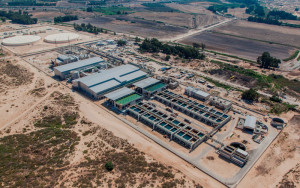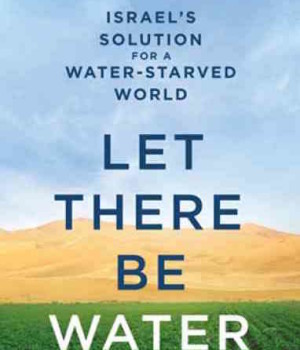This book will make you cry. Or stamp your feet or beat your head against a wall.
The narrative is familiar. Israel, a (once) poor country in the middle of an arid space, surrounded by enemies, finds a way to make the desert bloom. Then, Israel finds a way to extend what it learned about water to other countries – poor and not poor. If it was only that, it would be a great story. But it is more. Israel has found a way to change the equation between people, money, water, and nature.
In Let There be Water, Seth M. Siegel begins with the early Zionist pioneers, talks the reader through technologies for water management, leak control, sewage treatment, desalination and conservation. He takes on pricing and social pressures for conservation, as well as park and river cleanup, and water for improving the quality of life in dry cities such as Beersheva. Did you know that straining out toilet paper from sewage can provide cellulosic material for use in the pulp and paper industry? That household cooking oil can be skimmed from sewage and recycled into industrial applications? That 85 percent of sewage can be reclaimed and recycled? Israel is aiming for 90 percent; the average in the U.S. is 8 percent.
Israel changed what it grew – giving up cotton and beef cattle as being too water-intensive – and started water policy and technology outreach to Africa, the U.S., China, India, Iran, and South America.
So why cry?
Because UC Berkeley in Oakland, CA is the heart of the BDS movement – boycott, disinvestment and sanction – against Israel; nasty, ugly and often anti-Semitic. But a 2014 Memorandum of Understanding between the State of California and Israel called for cooperation between California and Israeli businesses and universities. With no nod to irony or hypocrisy, Berkeley was one of the first to find projects on which it could cooperate with Israel. “Never mind that BDS in the corner; let’s have Israel help California.”
So why beat your head against a wall?
Because when you get to Chapter 9 and read about the self-defeating nature of the Palestinian Authority and the Hamas leadership in Gaza, you begin to understand the real reason there is no “peace process” between Israel and its near neighbors. The Palestinian leadership insists that Israel owes them water regardless of what they do or don’t do to conserve, maintain, or use it wisely. Palestinians go about drilling illegal wells, tossing raw sewage, and refusing maintenance on leaks. And, “starting in 2008 and accelerating since 2010, the PA has chosen to use water as one key area of non-cooperation with Israel.”
In 1967, four of the West Bank’s 708 cities and towns had running water. Today, about 96 percent of the West Bank’s population has running water piped into their homes – much of it from Israel’s systems. Since 2008, however, the PA says “any water or sewage project that provides any benefit to a settler community legitimizes the status quo arrangement over the territories the Palestinian Authority claims as its own.” “Fixing Palestinian water needs,” says Alon Tal of Ben Gurion University, “requires a level of pragmatism the Palestinian water officials haven’t been willing to show. They’ve politicized water and prefer to talk about rights rather than discussing solutions to the everyday water problems of their people. They prefer to blame Israel for everything than to take charge where they can and when they can.”
Rawabi, a planned Palestinian community, is a case in point. Existing Palestinian-Israeli protocols require the two sides to meet to discuss new pipelines for the town, but for years the PA refused to convene a meeting on principle. After the developer was nearly bankrupt and the PA was telling the world Israel was withholding water from thirsty Palestinians, Israel finally just turned on the water. The PA called it a win, but for the Palestinians who invested in the construction of the town and the Palestinians who hoped to live and work there, the delay was no win at all.
Because Gaza is a disaster ready to happen – happening already, in fact – between illegal wells draining the aquifer, salt water running in to fill the space, and lack of sewage treatment. When Israel had farms inside Gaza, the deal was to supply an amount of water to Gaza authorities equal to the amount used by the farms. When, in 2005, Israel left Gaza, the government continued providing the water – and later doubled the amount. But that doesn’t address the underlying issues.
Both on the West Bank and in Gaza, Palestinian professionals know what has to be done to create a more stable water environment, and privately lament the intrusion of politics into water policy. “Even if Hamas were able to finance, build and manage a desalination plant,” says Fadel Kawash, the former head of the Palestinian Water Authority, it would still need to coordinate with Israel, something they swear they will not do.
The problem and its solution are clear: Gaza can be saved and more misery for the people of Gaza averted, either with Israeli desalinated water or, when conditions are right, with a Gaza desalinated water plant of its own. In the meantime, Israel could sell water to Gaza or, even better, Israel could swap its desalinated water for Gaza’s sewage. Israel could treat the sewage and then use the reclaimed water for its agriculture in the western Negev adjacent to Gaza, benefitting Israel, the Palestinians, agriculture, and the environment.
Or not.
Chapter 10 on “Hydrodiplomacy” doesn’t help the head-banging problem either. Israel had water projects operating in most of the countries of sub-Saharan Africa until 1974 when, threatened by the Arab states, those countries broke relations with Israel and expelled its project workers. After the Oslo Accords, the African countries felt free to reestablish relations with Israel, including water projects, and today Israel operates in 29 African countries. The 20-year hiatus didn’t hurt Israel nearly as much as it did the people of those countries.

Ministry of Foreign Affairs)
Iran threw away its profitable and profoundly important water relationship with Israel after the Islamic Revolution of 1979, and India and China were late to the party because they didn’t want to have relations with Israel.
Not enough reasons to be frustrated?
Try this. Israel clearly has the brains and skill to think through a problem, and then formulate and implement a solution, often one that can a) be monetized and b) be used to improve the lives of poor people around the world; Let There be Water is a paean to that. But there is frustration in the thought of how many Israeli brain-hours have been spent solving the sorts of security problems that do not add to the national economy and that cannot provide the hope of better living for others in Israel or abroad. Creating tiny gas masks for babies. Building a security fence. Creating short, medium, and long range missile defenses that can read the trajectory of an incoming missile and not waste a shot on a missile headed for the sea or an unpopulated place. Building better tunnel detecting equipment. Putting safe rooms in every apartment and shelters in every building.
And then there is the problem those who just can’t resist poking at Israel – wannabes using decades-old experience to claim authority. In 1969 – a lifetime ago in research terms – there was a Rand Corporation study on nuclear desalinization; forty-seven years ago, it was deemed economically unfeasible. In 2015, that study serves as the bona fides of a book reviewer who spent the rest of his career doing other things in other places.

He pokes. “Let There Be Water does not provide the information necessary to assess some of its claims—like, for example, the assertion that Israeli desalination methods can provide affordable water for California. In truth, those methods have yet to make sufficient water available to the West Bank and the Jordan Valley, where the cost of transporting desalinated water from the Mediterranean to higher elevations is substantial.” Book reviewer skipped the part where Israel decided not to transport the water from the Med to the higher elevations, but rather trade water among various localities. Water wasn’t supposed to go from the Med to Jordan, but rather free up Jordan River water for Jordan by using desalinated Med water nearer the coast.
One more, for good measure. “Although Siegel doesn’t mention this, cotton acreage in Israel has been reduced almost eightfold from its peak in 1985, presumably a result of higher water prices.” Yes, actually, he does on page 116. “The amount of cotton, a water-intensive crop – planted in Israel was cut by about 75 percent. Scientific grants were given for research into plants that would grow without large amounts of water.” In other words, not only did Siegel do what the reviewer said he did not do, but Israeli policy encouraged what a rational consuming country would do – change crops based on water availability.
Let There Be Water is supposed to be a “feel-good” book – and it is. It cheerleads and waves the flag. But few flags are more worth waving. The world has a water problem and Israel has solutions – not all of them, but enough of them to make a difference. And if you stop banging your head against problems Israel is not trying to solve, you can appreciate just what a marvelous job a small and once-poor country has done on the problem it set out to solve.






